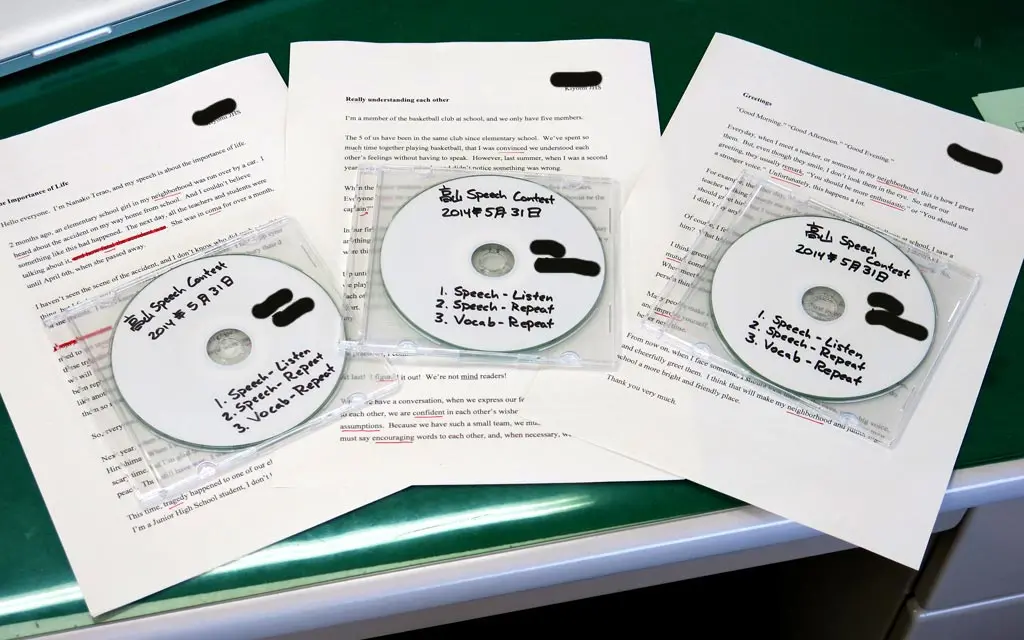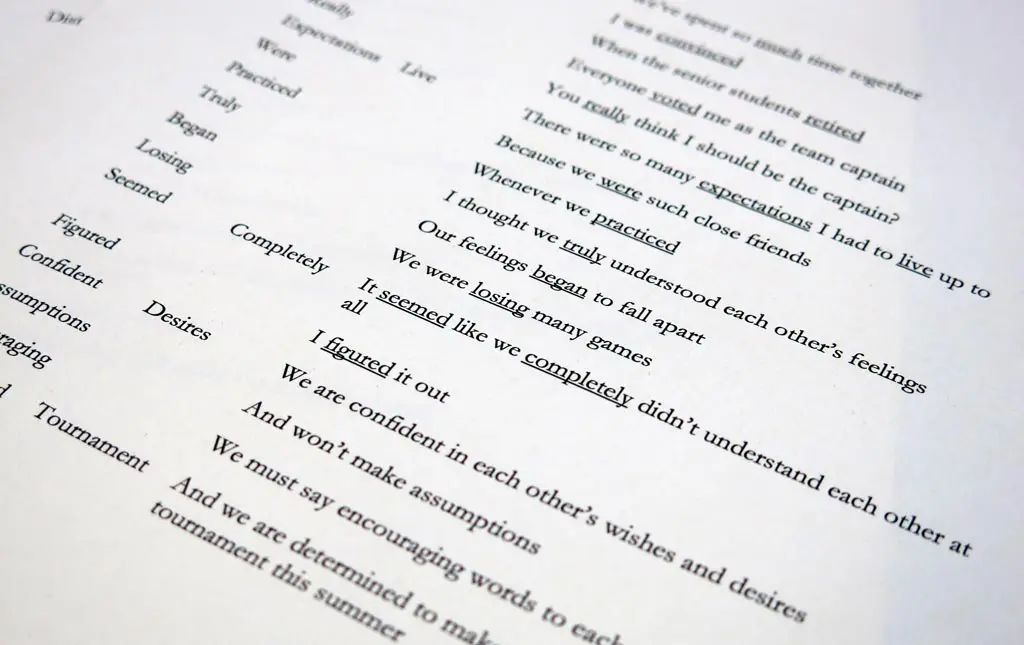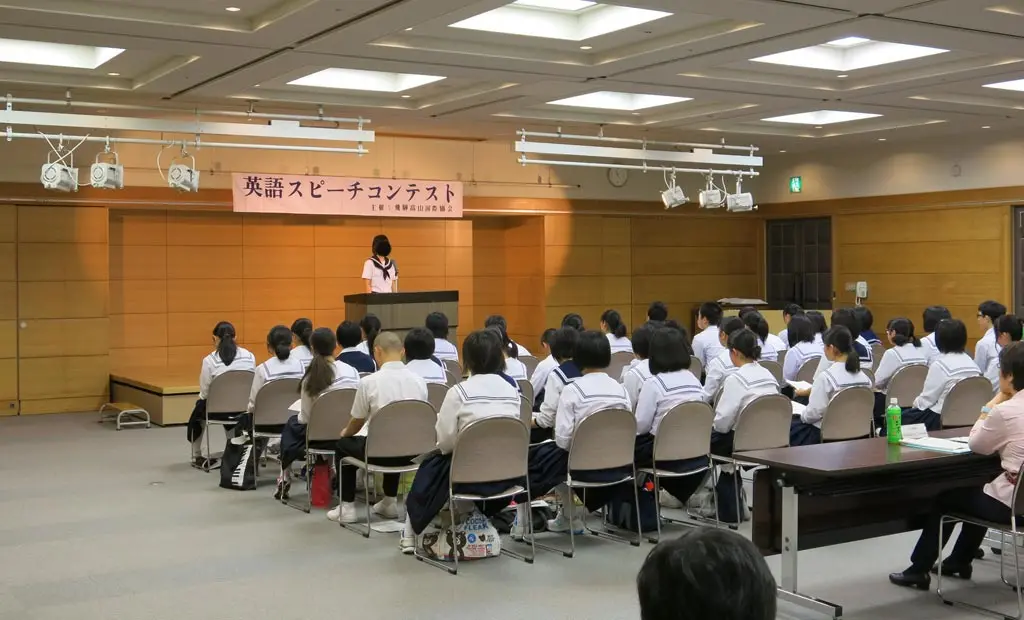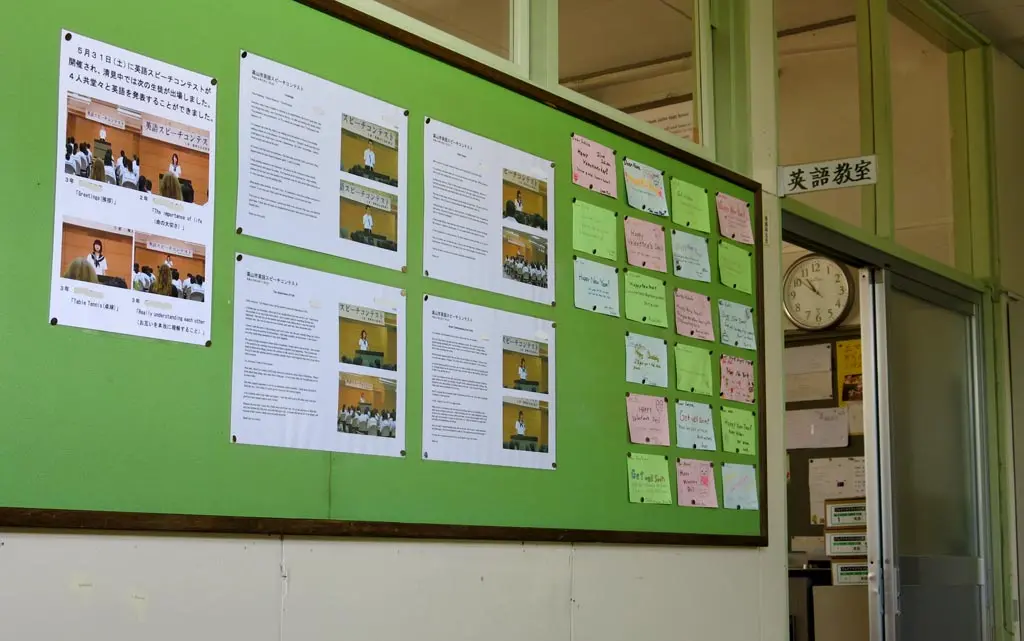Every year, the municipality of Takayama City holds an English Speech Contest for its Junior High school students. This contest is usually held at the end of May, or beginning of June, and it's separate from the regional speech contest that leads to the nationals. This contest is Takayama only, and allows the top 25 (or so) students to study abroad for a week in either the United States or Australia.
This year, the contest was held on Saturday, May 31st.
Last year, I taught at Higashiyama JHS 東山中 and we had 8 students participate in the contest. Overall, there were 81 participates. One of my students got 2nd in the contest! And overall, 2 Higashiyama students were able to study abroad.
This year, I'm teaching at Kiyomi JHS 清見中, which is a much smaller school then Higashiyama. There's around 70 students compared to Higashiyama's 400. At Kiyomi, the English department is much more open because it's just the one English teacher and me. Both of us, together, make the team. Higashiyama had of 4 (or 5) teachers, and I was mostly extra. I was kept out of the loop constantly. As such, whenever we get some city-wide fax about English, at Higashiyama I never knew about it, or anything that was going on. At Kiyomi, everything is widely available to me, and I can take a look at it, and try to understand what's going on.
For the speech contest, I knew the information was coming down the pipeline, so I was waiting for it. We finally got the information on April 7th, and the English teacher just gave it to me to look over. I didn't realize this before, but the participation in the speech contest is limited based on the attendance at that particular Junior High school. Higashiyama's 400 students allows them to enter 12 students in the contest. Kiyomi's much smaller attendance only allows 4.
But, being at a smaller school has great advantages. I know every student in the school, and have read all of their writing assignments. I know about the things they like, and are passionate about. And I know their level of English, too. I immediately knew which students I wanted to participate in this contest. Rather than post a notice in the classroom for everyone to ignore, I asked these students directly. I had 8 students in mind, and asked them whether or not they were able to attend. By the next week, I told them I wanted 4 of them to enter the contest.
By the next Friday, April 18th, I had my 4 participates. I wasn't able to get 2 of my ideal students because they were too busy with club activities. For my 4 students, I got them a copy of the contest information and rules, a copy of the entry form, and asked them to write me a speech in Japanese by the next Friday (4/25).
Also, the submission deadline was Friday May 9th. For this contest, only the entry form was required. We were not required to submit the speech itself.
The 25th came pretty quickly, and I received written speeches from all the students. :) It's so nice when students actually listen and do what you ask of them. It totally makes sense that the better English sparkers in the school are very studious, as well. That weekend, I went through the process of translating the speeches.
Yes, I think the students probably should have tried to write the English speeches themselves, but it's very difficult to proofread and correct an English assignment when I'm not entirely sure of the meaning behind it. I wanted a complete speech written in Japanese, so I could fully understand what they were trying to say. I think for the next contest, I will have the students try to write the English version, in addition to the Japanese.
Translating the speeches was not as difficult as I thought it would be. They were all handwritten, so I had to decipher the Kanji with a dictionary anyways. As I did so, I made a running vocabulary list of the Kanji, its reading, and its meaning. I actually knew most of the grammar in the speech, too, so after plugging in the vocabulary, I had the meaning and could write an English sentence. Also, after I had the Japanese text typed in Word, I dumped it into Google Translate so I had an extra translation to compare with. It wasn't usable on its own, but certainly helped catching mistakes I made.
On Monday, I had the 4 speeches translated, and gave print-outs to the English teacher for a final proofread and translation check.
I should note that at this point, the English was a direct translation of the Japanese. It was not meant to be the finished speech for the students. I wanted to establish the meaning, so I could write an actual English speech from it.
2 of the speeches were pretty good, and 2 of the speeches were not so good.
One of the speeches was great! It had a lot of emotion and impact. It was about an elementary school girl was run over by a car a few months ago. The other good speech was about club activities at school, but it told a very nice story of problems she had, and how she overcame them. Good speech material.
The other 2 were a little short. One speech, about greetings, didn't really have any resolution to the conflict introduced at the beginning of the speech. The rest of the speech was alright, so I had the student write an addition paragraph to complete the conflict.
The other one was about how living in such a small town creates social roles for everyone, and that you can't break out of them. It seemed really interesting to me, but it didn't have a story, or a purpose, or any general aim. It just seemed like information, but even then, it wasn't presented very well. The English teacher even mentioned that he wasn't able to understand it by reading the Japanese.
We asked her to fix it, and she just wrote a completely new speech. This one was about club activities. It had a similar theme to the other student's club activity speech, but it had its own voice, and was good enough. It could have used a little more conflict, or some kind of revolution made by the speaker, but it was complete as is.
With the translations complete, writing the 4 speeches wasn't too difficult. I think the biggest problem with translating and writing the speeches myself is that they tend to be written in my voice, rather than the students.
I don't really consider myself a writer, but I have been writing about random things for quite a while now. Very early on, I made the decision to simply write exactly how I talked. When I read someone's work, if they write how they talk, I never feel like I'm fighting the text to understand. I understand the ideas naturally as if they actually were explaining it to me, rather than burying the meaning in pose or other literary nonsense.
Because I'm not a writer, this is how I write, and it's difficult to avoid that when writing a speech for someone else. I think this is the second best reason to make the students write their own speeches. (The first reason being practice.) But, having their full Japanese text can help me identify a voice, and try to include that when writing.
In some of the speeches, I was able to identify some repetition, and uniqueness that I thought was a voice of theirs. So, I was sure to include that rhythm into their English speech.
For example, there's the following line in one of the speeches:
練習の時でも、試合の時でも、何も言わなくても、今まで一緒にいた仲間だから気持ちは通じていると私達は思っていたので、お互いに声をかけ合わなかったのです。
I thought the repetition of でも, でも, ても was a clear conscious writing decision. Later in the speech, there were two other sentences that repeated 3 times to emphasis what they were trying to say.
For the above sentence, I had this translation:
Even when we practice. Even when we play a game. Even when we don’t say anything. Up until now, because we were such close friends, we thought we could truly understand each other’s feelings without having to say anything.
So, when I finally wrote this into the speech, it was the following:
Up until now, because we were such close friends, whenever we practiced, whenever we played a game, whenever we didn’t say anything, I thought we truly understood each other’s feelings.
I tired to keep that same flow.
By Friday May 2nd, I had the speeches written, and I had each student read through the speech once on their own. As they read, I circled any words or contents they had trouble saying or pronouncing correctly. I tried not to use too many big words, but there were some instances where I should've dumbed it down more.
For each students, I now had a list of words and trouble areas I could focus on. Over that weekend, I made CDs for the students to practice with. The first track was of me simply reading through the speech. I read at a pace that I felt was equal to the student's. For the second track, I read a sentence, then left a pause of equal length. This way the student's could repeat after the CD. The third track focused on these problem areas. I made a vocabulary sheet of each difficult word, and then sentence it was used in. I read the word 3 times with a pause for the student to repeat. Then I read the sentence 3 times with pauses.
By the next week, I had the following things for each student: 1 written speech, 1 vocabulary sheet, and 1 CD.


Now the students could practice on their own, and have an English example to emulate. In addition, starting on May 9th, before school, and during the lunch recess, I scheduled times for each students to meet with me, and meet with the English teacher to perform and practice their speeches in person.
I didn't make this known to the student, but I had the following checklist, or flowchart, or whatever when teaching the students how to perform their speech.
1. Pronunciation
2. Rhythm
3. Memorizing
4. Gestures / Attitude / Performance
First, I focused a lot on the pronunciation of their speech. I made sure their Rs, Ls, THs, etc sounded good. As well as other difficult words. Most of this is covered on the CD for the students to practice at home. When I'm actually practicing with the student in person, the student can watch my mouth to see how to make the correct sounds.
Once they had great pronunciation, I moved to the next item: rhythm. There's a lot of ups and downs, and short pauses when saying sentences in English. There's plenty of words that are combined when speaking, too. One student's speeches had "in an instant" which is slurred when spoken.
After they had the pronunciation, rhythm and flow of the speech down, they had to memorize it. I'm not sure how much the students practiced the speeches on their own, but only one of the students actually memorized their speech. And even they weren't 100% perfect, and still needed a few cues. Again, I referred them to the CD. They could try to recite their speech by listening to the CD and repeat without looking at their speech's script.
The last step "gestures, attitude, and performance" is really what makes the speech. It's what elevates the contents of the speech into something interesting and memorable. Everything else is extremely important, but those are all building blocks to what wins the competition.
Unfortunately, I didn't make it to this step. The English teacher was very busy planning the 3年生 school trip, and managing the school's baseball team, that he rarely made it to any of the scheduled times. So, the times were all double booked, and I wasn't able to dedicate the time needed to each student.
To improve this process, I think I should make this known to the students. Also, I need to schedule a strict deadline of when they need to memorize their speech. Gestures, and attitude can be taught along the way, but I don't want to overwhelm them with all the steps at once. Once they memorize the speech, I think that's when they can remember that kind of advice and actually use it.
I practiced with the students for the next 3 weeks. On the last day before the contest, the English teacher had them perform their speeches in class. The students were super nervous, but I think it was really good for them. It was the first time they actually performed to an audience. We should've done this much earlier, and more often.
May 31st finally arrived. The doors of the competition opened at 9am, and all the students began to arrive. This year, we only had 51 students in the contest. (Last year was 81.) There were no 1年生 students for some reason.
My students were really nervous, but they arrived, and had a good attitude. I think some of them hated it, but they still faced the challenge, and performed their speeches when they were called on.

At the end of the competition, the top 5 students were given awards. None of my students made the top 5, but that's perfectly fine. I think it was an accomplishment for them to have entered and performed their speeches in the first place. It's not the first time any of them had to read in front of an audience. But it was the first time they wrote, rehearsed, and performed their own material to a large crowd. They were quite nervous, but they overcame their fears for those brief minutes.
Hopefully some of them will get the opportunity to study abroad. :) I think that would be an amazing experience for them.
With the competition over and behind them, I printed a bunch of photos and gave them to the students as a present.
Additionally, I created a sheet for each of the students that included their English speech and some photos. I printed each one, and posted it outside the English room for all the students in the school to view.

Hopefully this will motivate more students to want to do the contest.
Apparently, all 4 of my students did well enough to be selected for studying abroad to Australia this summer! Nice! I hope that take advantage of the opportunity and see more of this world. :)